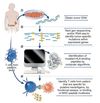Cancer Immunology Flashcards
Penetrance of tumors by T cells. . .
. . . improves prognosis
Adoptive transfer of T cells in mouse tumor models

neoantigens
The result of self proteins that are mutated as either a driver or passenger mutation in cancer. These are a potential source of foreigness signal in tumors.
Malignant tumors often _____ express _____ antigens.
Malignant tumors often abnormally express normal antigens.
This may lead to failure of tolerance against these antigens, provoking an immune response against the tumor, but also presenting the possibility of autoimmunity.
Oncogenic viral antigens
Some cancers are the result of viral activity, and so targeting immunity against the virus is synonymous with targeting immunity against the cancer.
Cancer-germline/cancer testis antigens
- Normally expressed only in testis, fetal ovaries, and trophoblasts
- Frequently expressed in cancer cells
- Not responsible for malignant phenotype
HER2/neu
- An epidermal growth factor receptor (EGFR) family receptor
- Overexpressed due to gene amplification in some breast cancers
- Contributes to malignant phenotype
prostate specific antigen
or PSA
expressed by normal and malignant prostate epithelial cells
Tissue differentiation antigen
tyrosinase
expressed by normal and malignant melanocytes
Tissue differentiation antigen
CD19
expressed by normal and malignant B lymphocytes
Tissue differentiation antigen
Derepression expression antigens

____ may overcome self tolerance, leading to killing of tumor cells.
Aberrant, uncontrolled overexpression may overcome self tolerance, leading to killing of tumor cells.
Mechanisms of tumor immunity

Which Immune Mechanisms are used to reject tumors?
- CD8+ CTL mediated killing-antigen specific (most and best evidence)
- CD4+ Th mediated help for CD8 T cells, classical macrophage activation.
- Th1 cells appear to be bad for the tumor; (Th2 responses are bad for the patient)
- Classical activation/M1 phenotype bad for tumor (alternative activation/M2 phenotype bad for patient)
- NK cell mediated killing
- Antibody mediated killing (opsonization and complement, ADCC)
- Not much evidence that endogenous antibody responses are effective
Tumor evasion of CTL immunity

Immunity induction checkpoint

Cytotoxicity checkpoint

Myeloid-derived suppressor cells
- Potent immunosuppressive activity
- formed in the bone marrow and, migrate to secondary lymphoid organs and the tumor
- Immunosuppressive expression of arginase, iNOS , TGF-β, IL-10 , and COX2
- Sequestration of cysteine
- Induction of Tregs
Differentiation of MDSCs

Immunosuppressive tumor microenvironment

Immune editing
The result of natural selection within the tumor microenvironment in response to the selective pressure of the adaptive immune system
CAR T cell therapy is currently used primarily for. . .
. . . B cell lymphoma, specifically against CD19.
Types of mAbs used in cancer therapy
- Some bind antigens on cancer cells targeting them for destruction by phagocytes, NK cells or complement
- Some bind soluble growth factors for tumors
- Some block activing receptors/growth factor receptors on cancer cells
- Some block checkpoints to enhance T cell responses
Conjugated monoclonal antibody cancer therapies
- mAbs joined to a chemotherapy drug or to a radioactive particle
- The mAb brings drugs or radioisotope directly to the cancer cells.



